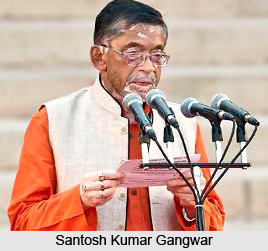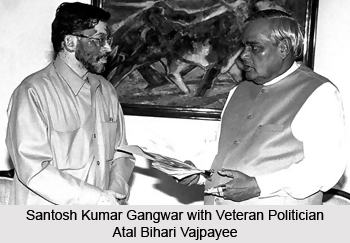 Santosh Kumar Gangwar is a leader of Bharatiya Janata Party (BJP), designated as the Minister of State for Textiles, Parliamentary Affairs, Water Resources, River Development and Ganga Rejuvenation in the Government of Narendra Modi, the 15th Prime Minister of India. He became the Member of Parliament in the 16th Lok Sabha representing the Bareilly constituency in the 2014 general elections. In the 14th Lok Sabha he was the chief whip of the party; however in the 15th Lok Sabha elections he got defeated with a narrow margin. He is also an active social worker and has been involved with Indian politics since a long time.
Santosh Kumar Gangwar is a leader of Bharatiya Janata Party (BJP), designated as the Minister of State for Textiles, Parliamentary Affairs, Water Resources, River Development and Ganga Rejuvenation in the Government of Narendra Modi, the 15th Prime Minister of India. He became the Member of Parliament in the 16th Lok Sabha representing the Bareilly constituency in the 2014 general elections. In the 14th Lok Sabha he was the chief whip of the party; however in the 15th Lok Sabha elections he got defeated with a narrow margin. He is also an active social worker and has been involved with Indian politics since a long time.
Early Life of Santosh Kumar Gangwar
Santosh Kumar Gangwar was born in a village called Teolia in the Bareilly district of the Indian state Uttar Pradesh on 1st November 1948 to Late Shri Ram Lal Gangwar and Smt. Sheela Devi Gangwar. He completed his education from Rohilkhand University at Bareilly and University of Agra.
Career of Santosh Kumar Gangwar
 Santosh Kumar Gangwar was imprisoned during the Emergency in charge of guiding a people`s movement against the Government of India. He later, in the year 1996, became a member of the Uttar Pradesh State BJP Working Committee and was designated as the General Secretary of the Uttar Pradesh BJP Unit. In 1989, he was elected for the first time to the 9th Lok Sabha after contesting from the Bareilly constituency. Till the year 2009 he was the representative of the Bareilly constituency, including six successive terms, and became a BJP Member of Parliament. Santosh Kumar Gangwar has been in charge of various ministerial posts in the Government of India. In the 13th Lok Sabha he was the Minister of State for Petroleum and Natural Gas along with the additional charge of Parliament Affairs. Before this, during October and November 1999, he was the Minister of State for Science and Technology along with the additional charge of Parliamentary Affairs. On 26th May 2014 he was sworn as the Minister of State in the Modi`s Government.
Santosh Kumar Gangwar was imprisoned during the Emergency in charge of guiding a people`s movement against the Government of India. He later, in the year 1996, became a member of the Uttar Pradesh State BJP Working Committee and was designated as the General Secretary of the Uttar Pradesh BJP Unit. In 1989, he was elected for the first time to the 9th Lok Sabha after contesting from the Bareilly constituency. Till the year 2009 he was the representative of the Bareilly constituency, including six successive terms, and became a BJP Member of Parliament. Santosh Kumar Gangwar has been in charge of various ministerial posts in the Government of India. In the 13th Lok Sabha he was the Minister of State for Petroleum and Natural Gas along with the additional charge of Parliament Affairs. Before this, during October and November 1999, he was the Minister of State for Science and Technology along with the additional charge of Parliamentary Affairs. On 26th May 2014 he was sworn as the Minister of State in the Modi`s Government.
Other Ventures of Santosh Kumar Gangwar
Santosh Kumar Gangwar played a key role the establishment of the Urban Co-operative Bank Ltd. in Bareilly. Since its inception in the year 1996, he served as its Chairman. He had also initiated a project in Bareilly for the development of villages. The project was based on Integrated Rural Development through Co-operative Movement using Animal Husbandry Technologies. His other noted contributions include the projects of Art library (Cantt), Mini Bye Pass and Chopula Railway Over Bridge.
Personal Life of Santosh Kumar Gangwar
Santosh Kumar Gangwar is married to Smt. Saubhagya Gangwar since 1st March 1975. The couple has a son and a daughter.
Positions Held by Santosh Kumar Gangwar
| Year | Positions Held |
| 1989 | Member, State Working Committee, Bharatiya Janata Party (B.J.P.),Uttar Pradesh |
| 1989 | Elected to 9th Lok Sabha |
| 1990 | Member, Committee on Privileges; Member, Consultative Committee, Ministry of Commerce; Member, Consultative Committee, Ministry of Transport and Tourism |
| 1991 | Re-elected to 10th Lok Sabha (2nd term) |
| 1991-96 | Whip, B.J.P. Parliamentary Party; Member, Committee on the Welfare of Scheduled Castes and Scheduled Tribes; Member, Committee on Estimates; Member, Committee on Government Assurances; Member, Consultative Committee, Ministry of Civil Aviation and Tourism |
| 1996 | Re-elected to 11th Lok Sabha (3rd term) |
| 1996 | onwards General Secretary, B.J.P., Uttar Pradesh |
| 1996-97 | Chairman, Committee on Agriculture |
| 1998 | Re-elected to 12th Lok Sabha (4th term) |
| 1998-99 | Union Minister of State, Petroleum and Natural Gas with additional charge of Parliamentary Affairs |
| 1999 | Re-elected to 13th Lok Sabha (5th term); Special Invitee, General Purposes Committee, Lok Sabha |
| Oct.-Nov. 1999 | Union Minister of State, Science & Technology in addition, assisted Minister of Parliamentary Affairs |
| 22 Nov. 1999- 29 Jan. 2003 | Union Minister of State, Petroleum & Natural Gas; and additional charge of Parliamentary Affairs |
| 29 Jan. 2003-24 May 2003 | Union Minister of State, Petroleum and Natural Gas |
| 24 May 2003- 8 Sept. 2003 | Union Minister of State, Parliamentary Affairs; Labour |
| 8 Sept. 2003- May 2004 | Union Minister of State, Heavy Industries & Public Enterprises and additional charge of Parliamentary Affairs |
| 2004 | Re-elected to 14th Lok Sabha (6th term); Member, Committee on Petroleum & Natural Gas; Member, Business Advisory Committee |




















